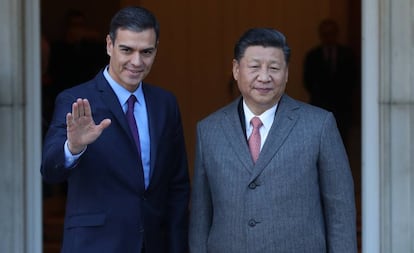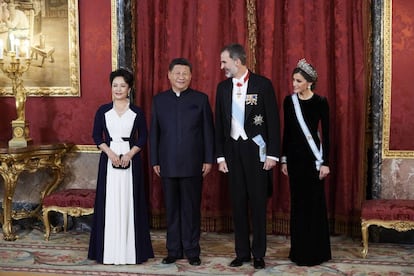Spain and China vow to “fight protectionism and unilateralism”
Chinese President Ji Xinping is on a three-day visit to Madrid to reinforce bilateral ties

In a joint declaration on occasion of Chinese President Xi Jinping’s three-day visit to Spain, both countries have vowed to reinforce their ties and to “fight protectionism and unilateral policies.”
Jinping arrived in Madrid on Tuesday on an official visit that ends today. It is the first time in 13 years that a Chinese head of state has come to Spain, and it also marks the 45th anniversary of the establishment of diplomatic relations between both countries. The president’s agenda includes meetings with King Felipe VI, with Prime Minister Pedro Sánchez, and with the speakers of Congress and the Senate.
Jinping said China will import goods worth $70 billion over the next five years to meet the demand of a growing middle class
During his stay, Jinping signed a joint statement that Beijing has described as a “roadmap” for the development of the bilateral relationship. The visit comes ahead of a decisive G-20 summit in which the Chinese president will meet face to face with US President Donald Trump in the midst of a trade war between both countries. In this light, the Madrid declaration represents a Spanish alignment with Beijing.
In the statement, Spain and China express support for “an economy that is global, open, balanced and inclusive, based on the rules of the World Trade Organization (WTO).” Both nations vow to promote a more open market and the elimination of all trade obstacles in a declaration “that re-launches comprehensive strategic relations with China,” according to La Moncloa, the seat of government.
In an address inside the former Senate floor, the Chinese leader pledged to open up his country to foreign products and investment, and to reinforce intellectual property rights. Jinping said China will import goods worth $70 billion over the next five years to meet the demand of a growing middle class, and he urged Spain to seize this opportunity to “climb new rungs” in the bilateral friendship and cooperation. “We need a lot of development of the highest quality, which will require a lot of innovation,” he said, encouraging Spain to join China’s Belt and Road Initiative to connect Asia with other parts of the world.

The Madrid declaration underscores many points that the current US administration would be unwilling to subscribe, including support for the Paris agreement on climate change. Without specifically citing Trump, the Chinese leader warned about the “unprecedented instability and uncertainty” of the current global context, and called on the international community to work towards consensus.
Besides the political statement, both countries have additionally signed several bilateral agreements covering a range of issues, from double taxation to scientific cooperation to the export of Spanish table grapes and pork products to China.
English version by Susana Urra.
Tu suscripción se está usando en otro dispositivo
¿Quieres añadir otro usuario a tu suscripción?
Si continúas leyendo en este dispositivo, no se podrá leer en el otro.
FlechaTu suscripción se está usando en otro dispositivo y solo puedes acceder a EL PAÍS desde un dispositivo a la vez.
Si quieres compartir tu cuenta, cambia tu suscripción a la modalidad Premium, así podrás añadir otro usuario. Cada uno accederá con su propia cuenta de email, lo que os permitirá personalizar vuestra experiencia en EL PAÍS.
¿Tienes una suscripción de empresa? Accede aquí para contratar más cuentas.
En el caso de no saber quién está usando tu cuenta, te recomendamos cambiar tu contraseña aquí.
Si decides continuar compartiendo tu cuenta, este mensaje se mostrará en tu dispositivo y en el de la otra persona que está usando tu cuenta de forma indefinida, afectando a tu experiencia de lectura. Puedes consultar aquí los términos y condiciones de la suscripción digital.








































